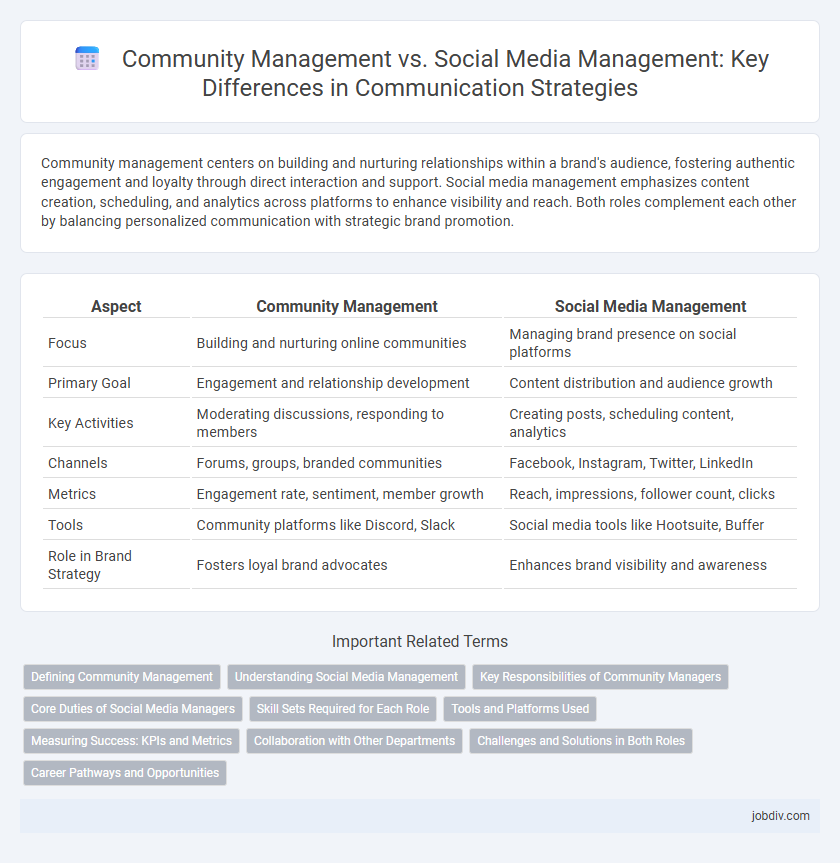Community management centers on building and nurturing relationships within a brand's audience, fostering authentic engagement and loyalty through direct interaction and support. Social media management emphasizes content creation, scheduling, and analytics across platforms to enhance visibility and reach. Both roles complement each other by balancing personalized communication with strategic brand promotion.
Table of Comparison
| Aspect | Community Management | Social Media Management |
|---|---|---|
| Focus | Building and nurturing online communities | Managing brand presence on social platforms |
| Primary Goal | Engagement and relationship development | Content distribution and audience growth |
| Key Activities | Moderating discussions, responding to members | Creating posts, scheduling content, analytics |
| Channels | Forums, groups, branded communities | Facebook, Instagram, Twitter, LinkedIn |
| Metrics | Engagement rate, sentiment, member growth | Reach, impressions, follower count, clicks |
| Tools | Community platforms like Discord, Slack | Social media tools like Hootsuite, Buffer |
| Role in Brand Strategy | Fosters loyal brand advocates | Enhances brand visibility and awareness |
Defining Community Management
Community management involves fostering meaningful interactions and building a loyal audience by engaging directly with members across platforms, creating a sense of belonging and trust. It emphasizes personalized communication, addressing individual feedback, and nurturing long-term relationships to strengthen brand affinity. Unlike social media management, community management prioritizes ongoing dialogue and active participation within a defined group or forum.
Understanding Social Media Management
Social media management involves curating, scheduling, and analyzing content across platforms like Facebook, Instagram, and Twitter to enhance brand visibility and engagement. It requires expertise in tools such as Hootsuite, Buffer, and analytics dashboards to track performance metrics and optimize campaigns. Effective social media management aligns messaging with marketing goals, driving audience growth and fostering brand loyalty.
Key Responsibilities of Community Managers
Community Managers are responsible for fostering genuine relationships, engaging with members, and nurturing a vibrant online community by responding to feedback and moderating conversations to maintain a positive environment. Their tasks include organizing events, facilitating discussions, and gathering insights to shape community growth and brand loyalty. Community Managers play a critical role in representing the brand's voice authentically and building trust through consistent and meaningful interaction.
Core Duties of Social Media Managers
Social Media Managers are responsible for creating, scheduling, and analyzing content across various platforms to increase brand awareness and engagement. They monitor social media trends, track performance metrics, and manage paid social advertising campaigns to optimize reach and ROI. Their core duties also include responding to audience interactions promptly and collaborating with marketing teams for cohesive communication strategies.
Skill Sets Required for Each Role
Community management requires skills in relationship building, conflict resolution, and deep engagement within niche audience groups, emphasizing authentic interaction and trust development. Social media management demands expertise in content creation, analytics interpretation, platform algorithms, and strategic campaign execution to optimize reach and engagement metrics. Both roles benefit from strong communication abilities, but community managers prioritize long-term loyalty, while social media managers focus on brand awareness and audience growth.
Tools and Platforms Used
Community management relies heavily on platforms like Discord, Slack, and Facebook Groups to facilitate direct interaction and foster relationships among members, using tools such as CRM systems and engagement tracking software for personalized communication. Social media management utilizes platforms like Hootsuite, Buffer, and Sprout Social to schedule content, monitor analytics, and manage multiple social channels including Instagram, Twitter, and LinkedIn. The choice of tools reflects the primary focus: community management centers on nurturing ongoing conversations and loyalty, while social media management emphasizes content distribution and brand visibility.
Measuring Success: KPIs and Metrics
Community Management measures success through KPIs such as member engagement rate, sentiment analysis, and retention rate, reflecting the depth of relationships within a community. Social Media Management relies on metrics like reach, impressions, click-through rates (CTR), and follower growth to gauge brand visibility and campaign effectiveness. Both disciplines use analytics tools but prioritize different indicators tailored to fostering community loyalty versus maximizing audience exposure.
Collaboration with Other Departments
Community Management fosters direct interaction with customers, providing valuable insights that help shape product development and customer service strategies across departments. Social Media Management coordinates promotional campaigns and brand messaging, requiring close collaboration with marketing, PR, and sales teams to ensure consistent communication. Effective collaboration between these roles enhances overall organizational responsiveness and strengthens cross-departmental alignment.
Challenges and Solutions in Both Roles
Community management faces challenges such as fostering authentic engagement and moderating diverse conversations, requiring active listening and conflict resolution skills. Social media management struggles with content consistency, algorithm changes, and analytics interpretation, demanding strategic planning and data-driven decision-making. Both roles benefit from integrated tools and continuous audience feedback to enhance communication effectiveness and brand loyalty.
Career Pathways and Opportunities
Community Management emphasizes building deep, long-term relationships within niche groups, offering career pathways in roles such as Community Strategist, Engagement Specialist, and Brand Advocate. Social Media Management focuses on crafting and executing broader content strategies across multiple platforms, leading to opportunities like Social Media Manager, Content Creator, and Digital Marketing Analyst. Both fields demand strong communication skills but differ in focus: Community Management centers on interaction and loyalty, while Social Media Management prioritizes brand visibility and campaign performance.
Community Management vs Social Media Management Infographic

 jobdiv.com
jobdiv.com